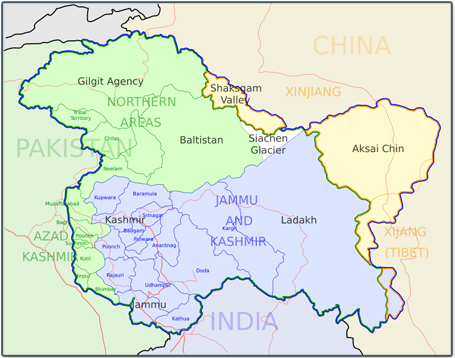Indo-American Kashmir Forum(IAKF)
he Indo-American Kashmir Forum, commonly known as IAKF, was formed in 1991. IAKF represents the socio-political voice of the Kashmiri Pandit community residing in the United States. The Kashmiri Pandits, followers of the Shaivite branch of the Hindu religion, are aboriginal people of the Kashmir valley with nearly 5,000 year history much of which is well documented through archeological discoveries and written records. Following the march of Islam into Kashmir in the 14th Century, the followers of the Hindu faith were reduced to a minority. Repeated intrusions by foreign settlers during the Islamic rule led to further dwindling of Pandit population in Kashmir. By 1947, when the British rule ended in the Indian subcontinent, the Pandits in the princely state of Jammu and Kashmir had been reduced to a miniscule minority. In the post-independence period, even though some Kashmiri Pandits rose to eminence in state and central governments, most Pandits continued to suffer economically and politically resulting in their steady migration from the valley to other parts of the world. By mid-1980’s Pandit population in Kashmir was reduced to about 4% of the total population in the valley.
IAKF was created after many expatriate Pandits received reports from their relatives in Kashmir about the growing Islamic insurgency in the state which was turning increasingly violent. Many Kashmiri Pandits were systematically victimized by Islamic terrorists, who were recruited, armed and trained in neighboring Islamic countries. Brutalities against the peaceful Pandit community were exceptionally cruel and lacking adequate safety and protection of the state, they were forced to flee from their homes and hearths. The forced exodus led to internal displacement of over 350,000 Pandits from their ancestral lands. The internally displaced Pandits represent over 95% of their original total population in the valley in 1990.
IAKF took up the cause to inform the world community of the oppression against Kashmiri Pandits that led to their forced exile from Kashmir and about the sad plight of the community members, many of whom are still living in makeshift ‘refugee’ camps. The poor condition of Pandits who stayed in the valley and did not leave during peak periods of violence is an untold story as they have been denied their social, economic and human rights by a hegemonic majority and the state government that are indifferent to their plight and needs. The U.S. based organization advocates assistance to the miniscule Pandit community in the valley, and seeks the return of displaced Pandits to Kashmir with dignity and honor.
IAKF interacts with the U.S. Administration, the U.S. Congress, think tanks and universities specializing in South Asian affairs, individual policy specialists, and media. IAKF works in conjunction with several different organizations abroad, including its sister organizations, the Indo-Canadian Kashmir Forum (ICKF) and the Indo-European Kashmir Forum (IEKF).
Click here to open the IAKF website
- A video interview detailing the genesis of political advocacy by Kashmiri Pandits in the U.S. and key accomplishments of IAKF – 25 August 2025
Why you should buy the Book, “The Kashmir Chronicles (1986-2023): Neoteric Analyses of a Rapidly Changing Situation,” by Vijay K. Sazawal, Ph.D.
- Details about how advocacy for a humanitarian cause was pursued in the Western societies and multi-national forums like the UNHRC that produced desirable results.
- How the idea of self-determination germinated in Kashmir, and who was responsible for carrying through that policy as a result of which he received the Nobel Peace Prize.
- Original research detailing how APHC was created by the U.S. and why the U.S. abandoned APHC in due course resulting in its eventual demise.
- What became the turning point for the U.S. Government to vigorously pursue humanitarian relief for Kashmiri Pandits following PM Vajpayee’s speech in Srinagar on 18th April 2003, resulting in the creation of the PM’s Relief Package for Kashmiri Migrants in 2008.
- Original research on how India was diplomatically unprepared for the Agra Summit in July 2001, a topical expose’ which was subsequently affirmed by other writers (retired officials) two decades later.
- Snapshots of the breakdown in law and order through deep dives in the Amarnathji Agitation (2008) and the Shopian Tragedy (2009) incidents to exemplify the nefarious power of “street politics” in Kashmir.
- Original proposal on the U.S. approved approach towards a holistic resolution of the Jammu & Kashmir issue (on both sides of the LAC) to the International Peace Research Institute Oslo (IPRIO), Norway in 2002.
- Provides details of an unannounced visit by a representative of the UN Body in 1998 from USA to the Kashmiri Pandit refugee camps in Jammu and Delhi to determine whether Kashmiri migrants could qualify for the Internally Displaced Persons (IDP) status that ended in a failure.
- All (100%) of the book royalties go to a registered charitable organization for nurturing disadvantaged children in India – Kakini Foundation (www.kakini.org).

